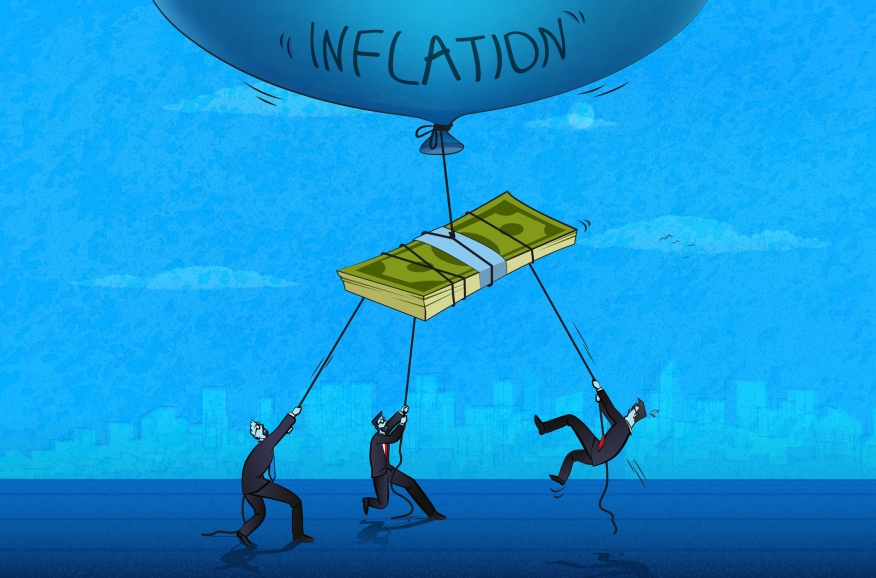
Inflation Eases As Fed Opens Final Meeting Of 2022

November CPI report shows annual inflation at 7.1% in November, down from 7.7% in October.
- The CPI rose 0.1% in November on a seasonally adjusted basis, after increasing 0.4% in October.
- Core inflation rose 0.2% in November from a month earlier, after rising 0.3% in October.
- CPI was released the same day the Federal Open Market Committee begins its final two-day meeting of 2022.
Inflation showed more signs of slowing in November, raising expectations that the Federal Reserve will pull back a bit on its interest rate hikes.
The Consumer Price Index (CPI) rose 0.1% in November on a seasonally adjusted basis, after increasing 0.4% in October, the U.S. Bureau of Labor Statistics (BLS) reported Tuesday.
Over the past 12 months, the all-items index increased 7.1% before seasonal adjustment, down from a 7.7% annual increase in October.
Both the annual and monthly increases beat analysts expectations. According to the Washington Post, analysts had predicted November’s monthly increase would be 0.2% and the annual increase would be 7.3%.
The index for shelter was once again the largest contributor to the monthly increase, rising 0.6% from October, more than offsetting decreases in the energy indexes. The energy index decreased 1.6% over the month as the gasoline index (-2%), the natural gas index (-3.5%), and the electricity index (-0.2%) all declined.
The food index increased 0.5% over the month, with the food at home index also rising 0.5%.
The index for all items less food and energy — considered the core inflation rate — rose 0.2% in November, after rising 0.3% in October.
The indexes for shelter, communication, recreation, motor vehicle insurance, education, and apparel were among those that increased over the month. Indexes that declined in November included the used cars and trucks, medical care, and airline fares indexes.
The all-items index increased 7.1% for the 12 months ending in November, the smallest increase since the 12-month period ended Dec. 2021. The all-items less food and energy index rose 6% over the last 12 months.
The energy index increased 13.1% for the 12 months ending in November, and the food index increased 10.6% over the past year; all of these increases were smaller than for the period ending October.
The November CPI report was released the same day as the Federal Reserve Board’s Federal Open Market Committee begins its final two-day meeting of 2022. Since the start of the year, the FOMC has increased its federal funds rate six times, including consecutive increases of 0.75% during its past four meetings.
Following the November meeting, Federal Reserve Chairman Jerome Powell indicated that a 50-basis-point increase is likely at this month’s meeting, which ends Wednesday. That would raise the target rate for the rate to between 4.25% and 4.5%, a 15-year high. It’s also the fastest the Fed has increased the rate since the 1980s.
Connel Fullenkamp, an economics professor at Duke University, said ahead of Tuesday’s CPI report that he’s concerned that core inflation has been stronger than anticipated, “so I'm a little bit disappointed that the Fed committed so soon to a 50-basis-point increase. But, hey, it's their decision and I realize there's lots of uncertainty."
He added, “The problem that we've seen all along is that consumer spending has remained more robust and stronger than people anticipated."
While the Fed’s rate increases don’t directly affect mortgage rates, the cost of borrowing to buy a home has soared this year. Mortgage rates topped 7% in October, but have now fallen for four straight weeks. According to Freddie Mac, the 30-year fixed mortgage rate was 6.49% last week.
J.R. Gondeck, a partner and managing director with the financial advisory fimr Lerner Group, told Time magazine recently that, “From a mortgage perspective, rates have actually gone down even though the Fed has raised rates. We would expect the worst is over. We think you’re going to see lower rates into the next year despite further rate hikes.”
Odeta Kushi, deputy chief economist at First American Financial Corp., told Time that what the Fed ultimately decides to do will be interpreted by what observers were expecting. “If the market is surprised by the Fed’s projections, we could see some movement in mortgage rates — whether that surprise is to the upside or the downside,” she said.




